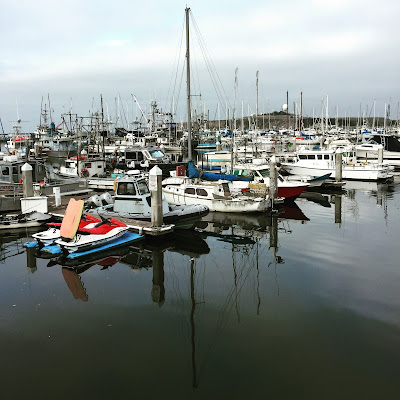The skating was part of a day off from cooking four of the five days of my break. For the first part of break, I worked at a tick-tock rhythm to make sure a Thanksgiving feast for the five of us was on the table Thursday; then, on Saturday and Sunday it was waves of tasks to fill the chest freezer with leftovers: a rich carcass stock, a couple turkey lasagnes of fresh spinach pasta sheets, freezer bags of meat packed in its own drippings, turkey pot pie. And then, back to work.
I mourned leaving my house to limp back to work on Monday. I sincerely love my job. But, I also love my home and feel like I get to spend so few days enjoying what it provides me. It felt good to stretch my cooking muscles this weekend, to put together a whole spread with all the parts that hopefully complement each other. But I don't have a single winter vegetable in the ground, and I still haven't built the gopher-wire lined beds that I will need for any of the good things my hands itch to grow. I haven't placed an order for the couple bareroot trees on my list. My kitchen gets some of my attention at least; my garden gets too little of it.
This weekend, before my fall on the ice, Scott and I had a half an hour or so to fix a leak in the roof. We climbed up a borrowed ladder, helping each other make that last stretch between the top step of the ladder and the edge of the flat roof. When we finished tarring the seam, I didn't want to crawl down. The city sprawled out like a jewel box in front of us, from Twin Peaks on the left edge of the view, a tiny corner of The Golden Gate peaking over hills, Bernal up close, The Mission tucked behind it, then The Castro and The Haight, the Park. In the distance straight ahead, the Marin Headlands. And scanning to the right, all of downtown, the Bay Bridge and Treasure Island. Oakland. Seeing it all nearly gives me goosebumps each time, and it's the view I get from not just the roof, but the backyard, too. It's my gardening view.
Tonight, as I sit here with ice on my still very sore knee, a book and a computer, I'm skipping out on something I really enjoy—my weekly Tuesday night date with a pottery wheel—but I need the book and the computer more tonight. I need to not leave my house. I need to be close to my own kitchen, to have my dog at my side, to look out my window to the distinct view that my house offers of the city. I need to sink into my home and place that order for fruit trees. I can't dig a garden bed because my body still hurts too much. But I can plan. I can dream. I can be inspired by the words of others who are writing up feelings I understand so well.
This is what happens to a cook when she spends so many hours gaping at the contents of the pan before her, waiting for doneness. It's not unlike the way a gardener watches her tomatoes ripen. Both end points mark the moment at which a vegetable contains as much liquid sweetness as it ever will. When perfectly cooked, a wedge of white turnip will drip juices as if its light purple veins run with fat, and its tissue will soften and taste like butter. On the raw side of things, an utterly ripe tomato at the end of August swings low on its vine, opalescent and suntanned gold at the shoulders, its voluptuous flesh nearly falling out of its skin.
To me, becoming a cook meant being able to spot that point and know the time came to stop—to pull it, slice it, and put it on a plate. Raw or cooked, that is the vegetable finale. And to me . . . it looks pretty much like happiness itself.
Amy Thielen, Give a Girl a Knife








